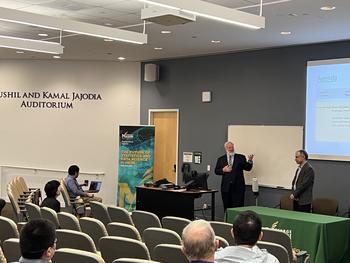In This Story
A journey of a thousand miles begins with a single step. Even though the Department of Statistics at George Mason University isn’t thousands of years old, its thirty-year milestone is a huge accomplishment with unlimited possibilities.

The Conference on Evolving Statistical Data Science celebrated 30 years of teaching, research, and collaboration. Mason Statistics professors, students, and professionals, as well as national and international leaders in statistics and data science from academia, government, and industry came together for two days of panel talks and networking. Welcoming remarks from College of Engineering and Computing Dean Ken Ball and Divisional Dean of the School of Computing Gurdip Singh kicked off the event. Attendees appreciated the progress of statistics over the last three decades, and what to expect moving forward when it comes to future curriculums and jobs.
Statistics Department Chair Jiayang Sun, a Bernard Dunn Eminent Scholar, said the event was fantastic.
“It not only spotlighted our faculty, students, staff, and alums but also brought in some of the best minds in statistics and data science in the world. We had an extremely inspiring keynote presentation, a thought-provoking closing talk, and distinguished panel discussions from leaders in various sectors,” said Sun.
She added that the posters, awards, and social events showcased student research and their creativity.
Keynote speaker Xiao-Li Meng, Whipple V.N. Jones professor of statistics at Harvard, spoke about Evolving ChatGPT: Data Engineering, Data Minding, and Data Intelligence. He emphasized data `minding’ not `mining,’ as one of the key points in the current AI revolution. In addition to ChatGPT’s ability to synthesize human collective intelligence at scale and with speed, the fact that it doesn’t provide the emotional intelligence involved in reaching a consensus from any large group of people, should not be overlooked.
“The absence of emotional entanglement is both powerful and dangerous, because the entanglement creates inefficiency but also a mechanism for avoiding extreme outcome,” Xiao-Li says.
“This could allow us to have more faculty and be able to train more people,” he says.
There is still a lot to think about in the future, especially when it comes to AI, ethical issues, and data privacy. Wasserstein joked that ChatGPT could always generate a code of ethics for AI.
Other distinguished speakers included Tigran Markaryan, a distinguished alumnus, VP of Analytics, Lifelenz; Jean Opsomer VP, Westat; Mason Statistics Professors William Rosenberger and John Stufken; and Sterling Thomas, Chief Scientist, Noblis.
The takeaways included information on grant opportunities from internal and external sources, and a poster presentation of statistics research projects from students.
Closing remarks were given by Heping Zhang, Susan Dwight Bliss professor of biostatistics, professor in the Child Study Center, and professor of statistics and data science at Yale University. His talk entitled Genes, Brain, and Us focused on the breakthroughs and challenges at the triangular interface between each pair of genes, brain, and health (aka everyone.)
